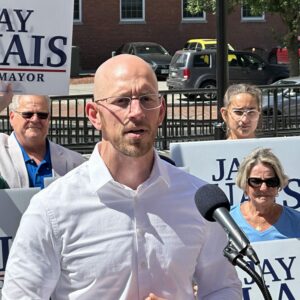On the eve of the first debate in the race for Manchester mayor, Republican Jay Ruais released a plan to address the city’s homeless crisis, which he called one of his top priorities as a candidate.
Not a priority? Putting the blame on Mayor Joyce Craig for the problem.
“The window is much bigger than the rearview mirror. I’m not interested in looking back at what other people have done, at the mistakes that were made,” Ruais told NHJournal at a Tuesday press conference. “It’s not effective, it’s not productive, and it’s not constructive to just throw elbows and think partisan politics is going to solve the problem.”
Ruais, who has talked openly about his own battle with addiction, said he understands the personal issues facing many of the city’s homeless. However, he added that the problem can’t be cured with compassion alone.
“I love our city and believe its best days lie ahead. But that is not a foregone conclusion. We have a homelessness crisis that we have failed to fix, and it is having a ripple effect throughout our city. We need a mayor with the vision and leadership to set a goal, establish a plan, and execute it with a sense of urgency,” Ruais said.
Manchester’s homeless crisis has been making headlines for years, including last winter’s Christmas week when two homeless people died, and a newborn was found abandoned. Critics decried Craig’s hapless attempts to address the issue. Craig responded by trying to blame Gov. Chris Sununu, saying homelessness is a state, not city, issue.
Craig has since entered the Democratic gubernatorial primary rather than seek reelection. Having Manchester’s homeless issue at the center of the mayor’s race isn’t going to help Craig’s statewide campaign, local political operatives say.
“It doesn’t matter if Jay wants to talk about how we got here or not. The fact is, Manchester has a terrible homelessness problem, and it happened on Joyce Craig’s watch,” said Rep. Will Infantine (R-Manchester). “The more all the candidates talk about the homeless crisis, the more it reminds voters about her failure and the more of a problem it is for Democrats as she runs for governor.”
Ruais’ plan to solve the homeless crisis includes supporting law enforcement and giving them “the necessary tools” to address the problems created by the homeless in public places. That includes “support[ing] the proposed ordinance change banning camping on public property.” Current law only allows police to enforce the ordinance police “when the individual is on public property, and there is an available overnight shelter.”
As a result, it is rarely enforced.
Ruais also proposed creating a “Homeless Court” for the city, similar to drug and veterans courts implemented elsewhere.
“A person with misdemeanor quality of life offenses may have difficulty getting a job, driver’s license, or housing. Let’s address those challenges through an alternate sentencing structure that requires accountability for their actions while connecting the individual with community partners to address their condition’s underlying causes and eliminate the impediments to a brighter future. This will help break the cycle on our streets,” Ruais said.
And, Ruais said, available community services can be better utilized if they target people with addiction issues, or who’ve been incarcerated, by focusing the delivery of services when these people are most vulnerable, “like when individuals are coming out of jail or the hospital after an overdose or health condition.”
Ruais also sees a role for the private sector when it comes to addressing the city’s shortage of available housing.
“We have an outdated bureaucracy in Manchester that impedes our ability to get housing to market quickly. We should continue to invest in affordable housing, while also cutting the red tape, prioritize and expedite the permitting and zoning processes for these projects, and better coordination within our city departments.”
Asked if he would be willing to back a budget that overrides the tax cap in order to implement his homelessness plan, Ruais’s answer was short and to the point: “I would not.”
Ruais is the lone Republican in the race, while three Democrats — Aldermen Kevin Cavanaugh, Will Stewart, and June Trisciani — have thrown their hats into the ring.
Infantine said Ruais’ focus on homelessness is smart politics. “I talk to people who are out knocking doors every weekend, and the only things voters in Manchester want to talk about are homelessness, drugs, and crime.”
The Manchester municipal primary is scheduled for September 19. The mayor’s race is nonpartisan, with the top two finishers in the primary facing off in the November 7 general election.





